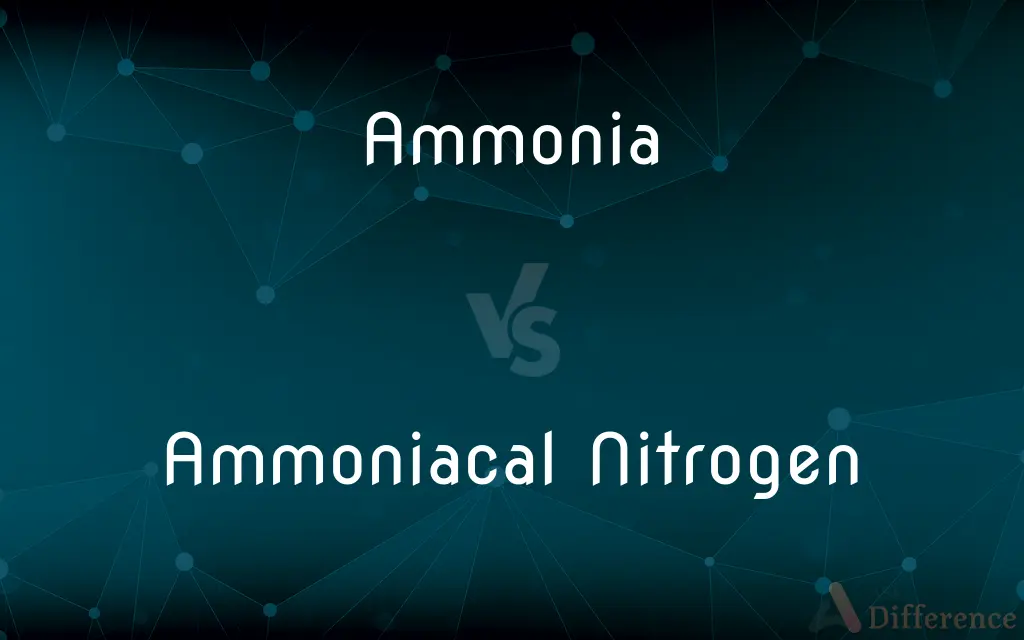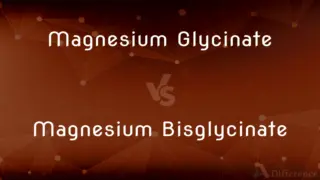Ammonia vs. Ammoniacal Nitrogen — What's the Difference?
By Tayyaba Rehman — Published on January 1, 2024
Ammonia is a compound of nitrogen and hydrogen (NH₃), while ammoniacal nitrogen refers to nitrogen content in the form of ammonia and ammonium in a substance.

Difference Between Ammonia and Ammoniacal Nitrogen
Table of Contents
ADVERTISEMENT
Key Differences
Ammonia is a chemical compound consisting of nitrogen and hydrogen atoms, with the formula NH₃. It's a colorless gas with a distinctive pungent smell, used in various industrial and commercial applications. Ammoniacal nitrogen, on the other hand, refers to the total concentration of nitrogen present as both ammonia (NH₃) and ammonium ion (NH₄⁺) in a sample, commonly in water or soil.
In its pure form, ammonia is a highly reactive and hazardous gas, commonly used in fertilizers, cleaning agents, and industrial processes. It can exist in equilibrium with its ionized form, ammonium, especially in aqueous solutions. Ammoniacal nitrogen is a broader term that encompasses the measurement of both ammonia gas and dissolved ammonium ions, indicating the extent of nitrogenous compounds in environmental samples.
Ammonia's role in industrial applications is significant, particularly in the synthesis of fertilizers, where it's a key component in producing nitrogen-rich compounds. In contrast, the measurement of ammoniacal nitrogen is crucial in environmental monitoring and wastewater treatment, as it helps assess the level of nitrogen pollution, which can affect water quality and ecosystem health.
The detection and quantification of ammonia in its pure form involve chemical and gas sensors, focusing on the gas itself. Measuring ammoniacal nitrogen, however, typically involves water analysis techniques, where both ammonia and ammonium ion concentrations are determined, often for regulatory compliance in water treatment facilities.
From a chemical standpoint, ammonia is a specific compound with well-defined properties. Ammoniacal nitrogen, however, is a term used in environmental science and water chemistry, representing a variable measurement based on the presence of nitrogen in the form of ammonia and ammonium ions in a sample.
ADVERTISEMENT
Comparison Chart
Composition
Nitrogen and hydrogen (NH₃)
Nitrogen in ammonia and ammonium (NH₃ + NH₄⁺)
Physical State
Colorless gas
Present in water or soil
Primary Use
Industrial and commercial applications
Environmental monitoring and water treatment
Measurement Focus
Pure ammonia
Nitrogen content in ammonia and ammonium form
Relevance
Industrial synthesis, fertilizers
Water quality, ecosystem health
Compare with Definitions
Ammonia
Chemical Compound: Nitrogen and hydrogen (NH₃).
The pungent smell in the cleaning solution is due to ammonia.
Ammoniacal Nitrogen
Nitrogen Measurement: Nitrogen in ammonia and ammonium forms.
Ammoniacal nitrogen levels are high in this wastewater sample.
Ammonia
Industrial Use: Used in fertilizers and cleaning products.
Ammonia is essential in manufacturing agricultural fertilizers.
Ammoniacal Nitrogen
Wastewater Treatment: Monitored in wastewater treatment.
Wastewater facilities must reduce ammoniacal nitrogen before discharge.
Ammonia
Gas Form: A colorless, pungent gas.
Ammonia gas is hazardous and needs careful handling.
Ammoniacal Nitrogen
Ecosystem Health: Affects water ecosystems.
High ammoniacal nitrogen can harm aquatic life.
Ammonia
Water Solubility: Soluble in water to form ammonium.
When dissolved in water, ammonia forms ammonium hydroxide.
Ammoniacal Nitrogen
Water Analysis: Analyzed in water or soil samples.
Testing for ammoniacal nitrogen is crucial for water quality control.
Ammonia
Reactive Nature: Highly reactive with other chemicals.
Ammonia reacts with acids to form ammonium salts.
Ammoniacal Nitrogen
Environmental Indicator: Indicates nitrogen pollution level.
Elevated ammoniacal nitrogen can signify environmental pollution.
Ammonia
A colorless, pungent gas, NH3, extensively used to manufacture fertilizers and a wide variety of nitrogen-containing organic and inorganic chemicals. Ammonia is the chief nitrogen product excreted by fish and other aquatic animals.
Ammonia
See ammonium hydroxide.
Ammonia
(inorganic compound) A gaseous compound of hydrogen and nitrogen, NH3, with a pungent smell and taste.
Ammonia
A solution of this compound in water used domestically as a cleaning fluid.
Never use ammonia to clean metal writing pens.
Ammonia
A gaseous compound of hydrogen and nitrogen, NH3, with a pungent smell and taste: - often called volatile alkali, and spirits of hartshorn.
Ammonia
A pungent gas compounded of nitrogen and hydrogen (NH3)
Ammonia
A water solution of ammonia
Common Curiosities
How is ammonia stored safely?
It's stored as a pressurized liquid in specialized containers.
What is ammonia used for?
It's used in fertilizers, cleaning products, and industrial processes.
Can ammonia be found in nature?
Yes, it's produced naturally by bacteria and decomposition.
Is ammoniacal nitrogen harmful to aquatic life?
High levels can be toxic to fish and other aquatic organisms.
Can ammonia be used as a refrigerant?
Yes, it's used in industrial refrigeration systems.
Are ammonia emissions regulated?
Yes, due to its potential health and environmental impacts.
What affects ammoniacal nitrogen levels in water?
Agricultural runoff, wastewater discharge, and natural processes.
Why is ammoniacal nitrogen important in water treatment?
It helps monitor and control nitrogen pollution in water.
Does ammoniacal nitrogen contribute to water eutrophication?
Yes, excessive amounts can lead to eutrophication in water bodies.
Can ammoniacal nitrogen be removed from water?
Yes, through various water treatment processes.
How is ammoniacal nitrogen measured?
Through water analysis techniques in environmental testing.
Do household cleaners always contain ammonia?
Not always, but it's common in many cleaning products.
What's the impact of ammoniacal nitrogen on plant growth?
It's a vital nutrient but can be harmful in excess.
Is ammonia hazardous to humans?
In high concentrations, it can be toxic and corrosive.
Is ammonia production energy-intensive?
Yes, its industrial synthesis requires significant energy.
Share Your Discovery

Previous Comparison
Corals vs. Sponges
Next Comparison
Magnesium Glycinate vs. Magnesium BisglycinateAuthor Spotlight
Written by
Tayyaba RehmanTayyaba Rehman is a distinguished writer, currently serving as a primary contributor to askdifference.com. As a researcher in semantics and etymology, Tayyaba's passion for the complexity of languages and their distinctions has found a perfect home on the platform. Tayyaba delves into the intricacies of language, distinguishing between commonly confused words and phrases, thereby providing clarity for readers worldwide.















































